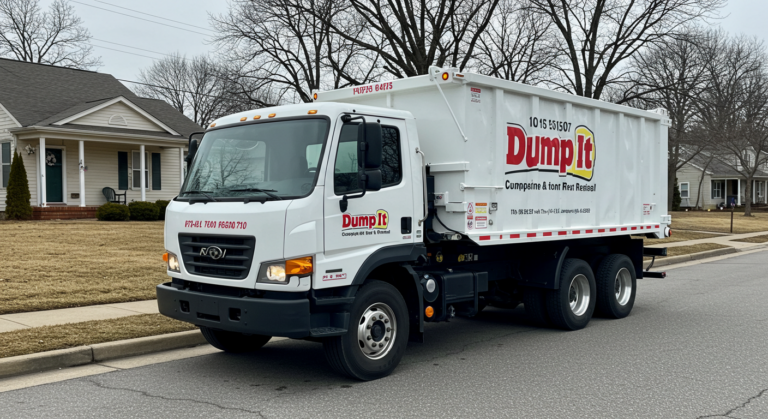How to Rent a Construction Dumpster for Your Project
Preparing for Delivery
Before scheduling the dumpster delivery, it’s crucial to assess the area where it will be placed. This location should be accessible for the delivery truck and allow enough space for the dumpster itself. Consider any nearby obstacles such as trees, power lines, or walls that could hinder the delivery process. Clear the area of debris and ensure that the ground is stable and level to prevent any safety hazards during the rental period.
Contact your local authorities to check for any permits or regulations regarding dumpster placement. Some areas may have restrictions that require you to obtain a permit, especially if the dumpster will be placed on a public sidewalk or street. Knowing these regulations beforehand can save time and avoid potential fines or delays. Having a clear plan in place for the dumpster’s delivery will streamline the process and help keep your project on track.
Ensuring Adequate Space for Placement
Before the dumpster arrives, it is essential to assess the area where it will be placed. Ensure that the location is clear of obstacles such as trees, utility lines, and any other potential hindrances. Measure the space to confirm that there is adequate room not only for the dumpster itself but also for the truck that will deliver and pick it up. Consider the types of materials you will be loading. A more accessible area will facilitate easier loading and minimize the amount of shuffling required later on.
Taking into account the type of surface where the dumpster will sit is also important. A flat, stable surface will ensure the dumpster remains secure during its time on your property. Avoid placing it on soft or uneven ground as this can lead to tipping or settling issues. If you are on a busy street, check for local regulations regarding placement, and consider whether a permit is necessary. Proper planning helps prevent misunderstandings and logistical issues throughout the rental period.
Properly Loading the Dumpster
When loading a construction dumpster, organizing your waste efficiently is essential. Start by placing larger, heavier pieces of debris at the bottom of the dumpster. This creates a stable base and prevents top-heavy conditions that can lead to safety hazards. Smaller items can then fill in the gaps around larger pieces, maximizing space and ensuring a safer load.
Be mindful of the weight limits specified by the rental company. Overloading a dumpster can result in additional fees or complications during pickup. It’s also advisable to avoid mixing hazardous materials such as chemicals or electronics with regular construction waste. Keeping materials separate not only ensures compliance with regulations but also promotes more responsible disposal methods.
Tips for Efficient Waste Disposal
Loading the dumpster efficiently can save time and ensure maximum use of space. Start by breaking down larger items to create additional space. This includes disassembling furniture or cutting materials into smaller pieces. Place heavier items at the bottom of the dumpster, distributing weight evenly across the bed. This approach helps avoid tipping and allows for better stacking of lighter materials on top.
Sorting waste before loading can also improve disposal efficiency. Separate materials like metal, wood, and concrete whenever possible. This not only streamlines the process but may also lead to reduced fees if recycling options are available. Avoid overloading the dumpster, as this can lead to safety hazards during transport and may incur extra charges. Keeping the waste contained within the designated limits simplifies the process and ensures compliance with rental agreements.
Knowing the Rental Terms
Understanding the rental terms is essential for a smooth experience when renting a construction dumpster. Each rental company may have different policies regarding rental periods, pricing structures, and prohibited items. Familiarizing yourself with these details can help prevent unexpected costs or complications during your project. Make sure to ask questions about what is included in the rental price as well as any additional fees that may arise.
Most rental services outline a specific time frame for the dumpster use, typically ranging from a few days to several weeks. If your project requires more time than initially anticipated, inquire about the process for extending the rental period. Additionally, be aware of any restrictions on weight or volume, as exceeding these limits can incur extra charges. Clear communication with the rental company ensures that you are adequately informed about all terms and conditions.
Understanding the Rental Period and Extensions
When renting a construction dumpster, it is important to be aware of the rental period specified in your agreement. Most companies offer a standard rental period, typically ranging from a few days to a couple of weeks. Factors such as the size of the dumpster and the nature of your project can influence the duration. It’s advisable to assess your workload realistically to choose a timeframe that accommodates both your needs and the rental terms.
In cases where your project needs more time than originally planned, many companies allow for rental extensions, though this usually incurs additional fees. To avoid surprises, clarify the extension policy upfront and understand the process for requesting more time. Staying informed about these terms can help prevent any disruption to your project timeline and ensure that you have the necessary resources throughout the duration of your waste disposal needs.
What to Avoid When Renting
Choosing the wrong size dumpster can lead to complications. Underestimating the volume of waste creates the need for multiple rentals, which adds to the project’s cost and leads to unnecessary delays. Overestimating can result in paying for unused space, which wastes resources. It’s essential to assess the project scope accurately and consult with the rental company to select an appropriate size.
Failing to understand restricted materials can lead to unexpected fees or legal issues. Many companies have guidelines on what can and cannot be disposed of, such as hazardous materials. Ignoring these rules can result in penalties or the need for additional waste disposal arrangements. Always clarify the rental terms and ensure compliance to avoid complications during the project.
Common Mistakes to Prevent
Renting a construction dumpster might seem straightforward, but several mistakes can lead to complications. One common error is underestimating the size of the dumpster needed. A smaller container can quickly fill up, resulting in additional trips and higher expenses. Always assess the volume of waste generated during the project and select a size that accommodates future needs without overloading.
Another frequent mistake involves neglecting to account for local regulations regarding dumpster placement. Failing to secure necessary permits can cause delays and even fines. Familiarize yourself with local guidelines to ensure that your dumpster is set up in compliance with community standards. Additionally, be mindful of not disposing of prohibited items, as doing so can incur extra fees or damage your reputation with the rental company.
FAQS
What size dumpster should I rent for my construction project?
The size of the dumpster you should rent depends on the scope of your project. Typically, sizes range from 10 to 40 cubic yards. For small renovations, a 10-20 yard dumpster may suffice, while larger projects may require a 30-40 yard dumpster.
How long can I keep the dumpster after renting it?
Most rental companies offer a standard rental period of 7 to 14 days. However, you can often request an extension for an additional fee if you need more time.
Can I put any type of waste in the dumpster?
No, certain materials are prohibited from being placed in dumpsters, including hazardous materials (like chemicals or batteries), tires, and appliances. Always check with your rental company for a list of accepted and prohibited items.
Is there a weight limit for the dumpster rental?
Yes, dumpster rentals typically have weight limits that vary by size and type. Exceeding this limit may result in additional fees, so it’s important to be mindful of the weight of your waste.
What should I do if I need to schedule a pick-up before the rental period ends?
If you need an early pick-up, contact your rental company as soon as possible to arrange it. There may be an additional charge for early collection, so it’s best to confirm the terms in advance.







